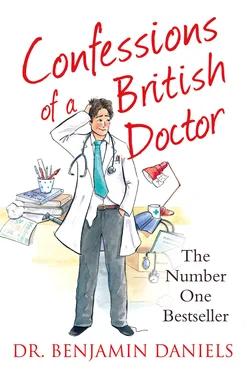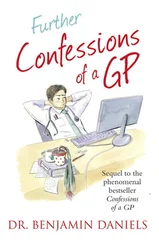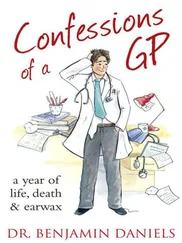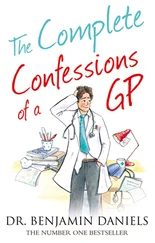Janine’s mum looks me straight in the eye. Her face looks like a pitbull slowly chewing a wasp. ‘It’s got nothing to do with her weight,’ she says angrily. ‘Janine’s cousin is as skinny as a rake and she has problems with her ankles, too. It’s hereditary.’
What can I say to that? My courageous leap got me nowhere. I belly-flopped painfully. Can I prove that Janine’s ankles hurt because she is fat? No. Is Janine’s mum going to accept that weight is an issue? No. I either argue on fruitlessly or accept that I am beaten and salvage the few scraps of the patient–doctor relationship that are still intact.
‘She can still do swimming!’ I shout as they waddle away, sick note and paracetamol prescription already tucked snugly into Mum’s handbag. It is a final attempt to redeem myself, but a poor one. I can picture Janine sitting in the changing rooms munching on some crisps while the rest of her class runs around outside. Beneath the many layers of abdominal fat, her pancreas would be slowly preparing itself for a lifetime of insulin resistance and the debilitating symptoms of diabetes that occur as a result. Meanwhile, her joints, straining under her weight, would be struggling to cope and the resulting damage would eventually develop into early onset arthritis.
Did I miss my chance to make a difference? Have I been a shit GP again? Are doctors slightly egotistical even to consider that a few well-placed words of advice from us can breach deeply entrenched lifestyle and dietary habits? ‘Hold on, kids, no more sugary drinks and turkey twizzlers for us. Dr Daniels thinks we are overweight and thank goodness he pointed it out or we would never have noticed. He’s given me a wonderful recipe for an organic celery and sunflower seed bake and we’re swimming to France at the weekend.’
A few years back I spent a stint working in a hospital in Mozambique. Each morning the American consultant would start the ward round with a prayer and then shout boldly and, with not the slightest hint of irony, ‘Come on team, let’s go save some lives!’ The rest of us would then cringe internally, roll our eyes at each other and then follow him round the morning’s array of sick and dying Africans. There are a surprising number of Western doctors filing around the wards of African hospitals. I’m not always sure of the motives but there we were: an American cardiologist, two British GPs and a French nurse. Between us, we had years of expensive medical training and lots of letters after our names. As we wandered through the wards, we didn’t really save many lives. The majority of our patients were dying of AIDS-related illnesses or malaria. There were no anti-AIDS drugs (antiretrovirals, ARVs) and even our malaria medication supply was low because of a robbery at the hospital pharmacy (an inside job).
Meanwhile, 30 miles outside of town, Rachel, a 22-year-old from Scotland with no letters after her name, really was saving lives. Rachel had dropped out of her sociology degree and had been working in a call centre before deciding to come and do some voluntary work in Mozambique. She had raised some sponsorship from back home and was touring the rural villages with a troop of local women. All she had at her disposal was a basketful of free condoms and a few hundred subsidised mosquito nets. Accompanied by information and education in the form of songs and posters, her campaign was a raging success. She later e-mailed me to say that malaria deaths had reduced and that she was hoping to have an equally good result with HIV transmission rates.
At the same time, my learned colleagues and I made clever diagnoses on the ward and skilfully inserted chest drains and spinal needles. Occasionally, we did save a life and it was quite exciting when a patient got up and went home after being at death’s door. As we waved them off, we knew that ultimately they would be back. They couldn’t afford to pay for the full course of medication, and it was only a matter of time before they were unwell again and back in our hospital. We were briefly prolonging lives rather than saving them.
Regardless of the country it is practised in, most of hospital medicine is painting over the cracks rather than fixing the wall. Lives are saved by preventing illness rather than curing it. If you are 64 and admitted to hospital in the UK with a heart attack, it will be all blue lights and running around. After emergency heart scans, a dashing young doctor will probably give you a whack of clot-busting medicine into your veins and it could save your life. At age 16, this was just the kind of exciting medicine that I imagined my job would be. I have been that doctor and at times it is genuinely quite glamorous and exhilarating. Sometimes, it does make a real difference and lives are saved. The patient and family will thank you and you’ll feel pretty good for a bit.
Конец ознакомительного фрагмента.
Текст предоставлен ООО «ЛитРес».
Прочитайте эту книгу целиком, купив полную легальную версию на ЛитРес.
Безопасно оплатить книгу можно банковской картой Visa, MasterCard, Maestro, со счета мобильного телефона, с платежного терминала, в салоне МТС или Связной, через PayPal, WebMoney, Яндекс.Деньги, QIWI Кошелек, бонусными картами или другим удобным Вам способом.












![Benjamin Franklin - Memoirs of Benjamin Franklin; Written by Himself. [Vol. 2 of 2]](/books/747975/benjamin-franklin-memoirs-of-benjamin-franklin-wr-thumb.webp)